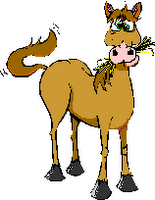 You want me to eat WHAT? I thought Beet Pulp was the last straw - even though it is now one of my favorite foods - but now you're telling me to hang out in the desert and eat cactus? This nouveau California cuisine may be OK for humans and burros - but I'm an elite equine and expect only the best.
You want me to eat WHAT? I thought Beet Pulp was the last straw - even though it is now one of my favorite foods - but now you're telling me to hang out in the desert and eat cactus? This nouveau California cuisine may be OK for humans and burros - but I'm an elite equine and expect only the best.OK, OK - I know I've been eating all the prickly pear cactus I can find all summer and that I look good and my coat is shiny but I thought that was because of the yummy hay you've been finding for us and that nice flax stuff you mix in with our beet pulp. But I have noticed that Choli keeps her girlish figure and wants to play a lot more when she munches on cactus all summer long. We won't tell you our secret, but you've noticed we never seem to have a problem with the "prickly" part, haven't you.
Well, even though we suspected that it might be good for us (the good stuff does seem to also be the yummy stuff) we'll go on just thinking of all that cactus as dessert. So what if it's got lots of vitamins, antioxidants, gooey mucilage (isn't that glue?) and pectin that makes our tummies feel good, plus antiinflammatory action that keeps us limber. And I guess it does help with glucose metabolism 'cause that's Choli's problem, right?

A nutrition summary for Nopales (prickly pear cactus pads) can be seen at NutritionData.com.
The website of Nopal Export (no longer active) outlines some of the "health benefits" of Nopales (as producers, they are admittedly biased).The benefits of primary interest for horses include GI tract protection provided by fiber, mucilage and pectins, lowering of blood lipids and improvement of insulin sensitivity. The pads are low in sugar/starch and high in fiber, which contributes to them being a "safer" forage for insulin resistant horses.
 |
| The first time I saw one of mine with a bright red nose and legs I thought for sure something awful had happened! |
The nutritional benefits seem to be present in both the pads and the fruit (the "pear"). It is a bit of a shock the first time you see a red mouth (or try to clean those white front socks) when the fruit ripens in early summer but you can relax knowing a little desert "dessert" is possibly good for your horse. My "one rat" study is just an observation that my insulin resistant mare looks and feels better when she is chowing down on summer's abundance of prickly pear.
Links
Wikipedia article on Nopales http://en.wikipedia.org/wiki/Nopal

So I can feed my horse prickly pears whole with the thorns on??
ReplyDeleteHi Janette ~
ReplyDeleteIf you are going to feed the pads to your horse, rather than letting him forage for prickly pear, I would remove the thorns.
When "foraging", my horses typically start at the fibrous base of the plant and kind of work their way up. They somehow manage to elude the thorns. During the summer when they seek out the red prickly pear fruit, which has short almost "fuzzy"stickers, they plow right through them. They don't seem to cause problems, unlike "foxtails", which can become embedded in the mucous membranes of horses and pets. Anyone with a dog or cat in foxtail country knows the dismay at finding foxtails imbedded between their pet's toe pads.
The video in this article shows how to singe spines off http://www.thesurvivalgardener.com/removing-spines-cactus-pads/.
You can also "shave" them with a knife.
If you do let your horse forage for prickly pear (or other thorny plant - everything here in AZ has thorns) you might want to check his mouth once in a while, just in case. Because I've never had a problem over the many years my horses have devoured prickly pear doesn't mean it can't happen.